Thousands turned out to protest the outcome of the first round of the French parliamentary elections on Sunday night, objecting to the French people having voted in greater numbers for Le Pen’s populists than the pan-left bloc.
France-wide election results trickled in overnight for the first round of the Parliamentary selection, largely confirming the exit polls published Sunday night and the opinion polling in the days running up to the vote. Marine Le Pen’s Rassemblement National (RN) is the largest party with 33.15 per cent of votes cast on the highest turnout for a French election in decades. The New Popular Front, a new pan-left alliance put together for this vote got 27.99 per cent and globalist-managerialist President Emmanuel Macron’s faction came in third with just 20.76 per cent.
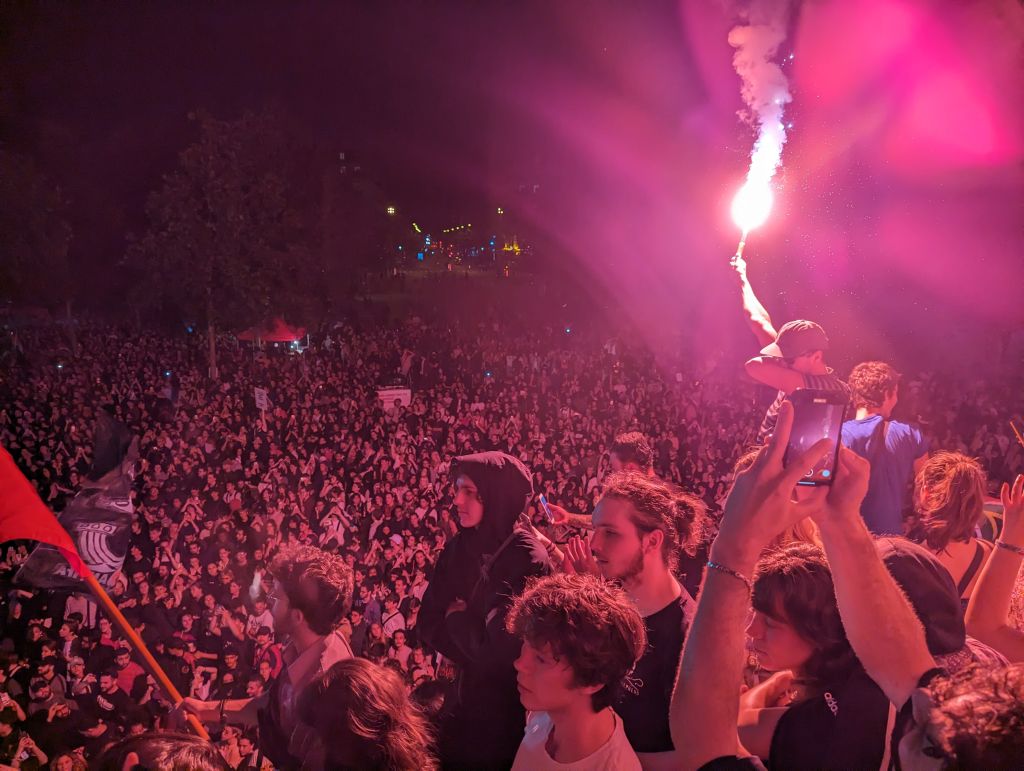
PARIS, FRANCE – JUNE 30: Demonstrators gather in Place de la Republique, to protest against the rising right-wing movement after the Rassemblement National’s victory in the first round of early general elections in Paris, France on June 30, 2024. (Photo by Luc Auffret/Anadolu via Getty Images)
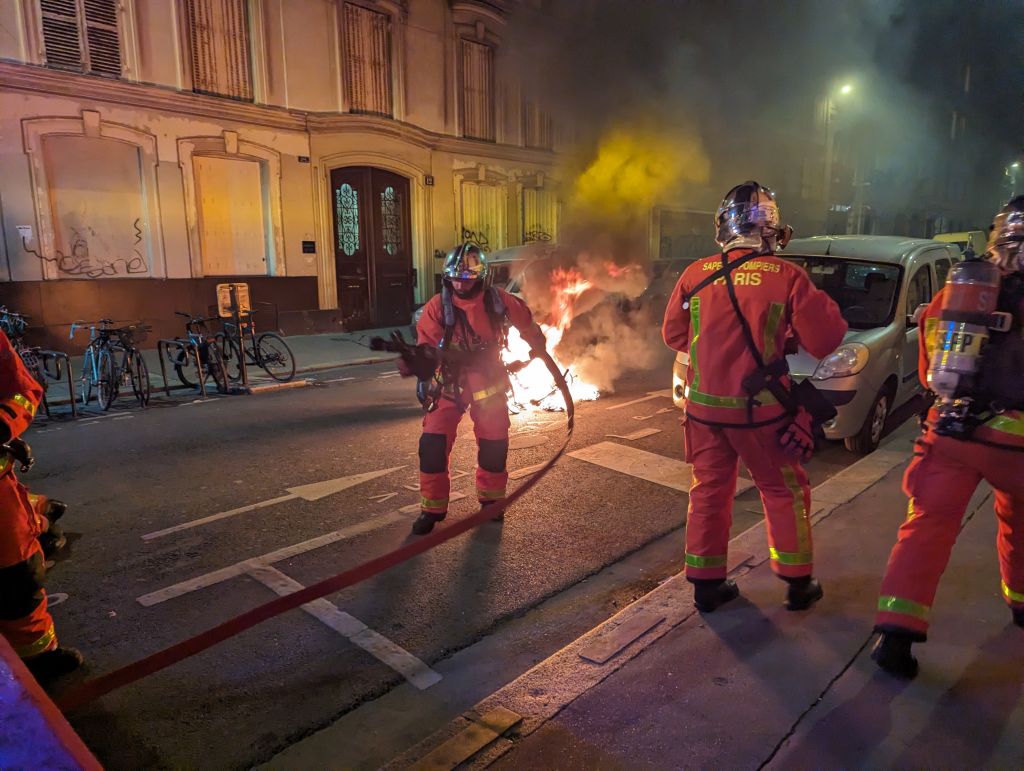
PARIS, FRANCE – JUNE 30: Firefighters intervene the fire after demonstrators fired fireworks at police and set a few fires during a demonstration in Paris, France on June 30, 2024. Demonstrators gather in Place de la Republique, to protest against the rising right-wing movement after the Rassemblement National’s victory in the first round of early general elections. (Photo by Luc Auffret/Anadolu via Getty Images)
The French people may have spoken at the ballot box, but the result clearly left some feeling very upset. Protests erupted in several French cities overnight, most particularly in Paris, where thousands gathered. The New Popular Front, which represents a spectrum of left wing parties from the pro-European Union centrists to full-blooded communists has earlier threatened they would “resist” the result if the RN won, and the protests may be the firs throes of that, although given there is a week to run until the second round of the election actually allocates the majority of the seats and decides whether Le Pen’s RN can command a majority in the house or not, perhaps expect more violence next week.
Le Soir notes the Monument to the Republic, a large limestone and bronze statue in the centre of Paris extolling the virtues of the nation and including a giant lion guarding a ballot box, was covered in graffiti by anti-right-wing protesters who scaled the stones and unfurled banners. The paper further relates that in the city of Lyon, police clashed with protesters who set off an explosive at a branch of American fast food chain McDonald’s and that missiles were exchanged between protesters and police in Nantes.
TF1 cited police sources who said there were 800 on the “against the far right” protest, who manifested as “a hostile group composed of hooded and masked individuals [which] was interrupted by the police in its attempt to enter the town hall of the 1st arrondissement of Lyon”.
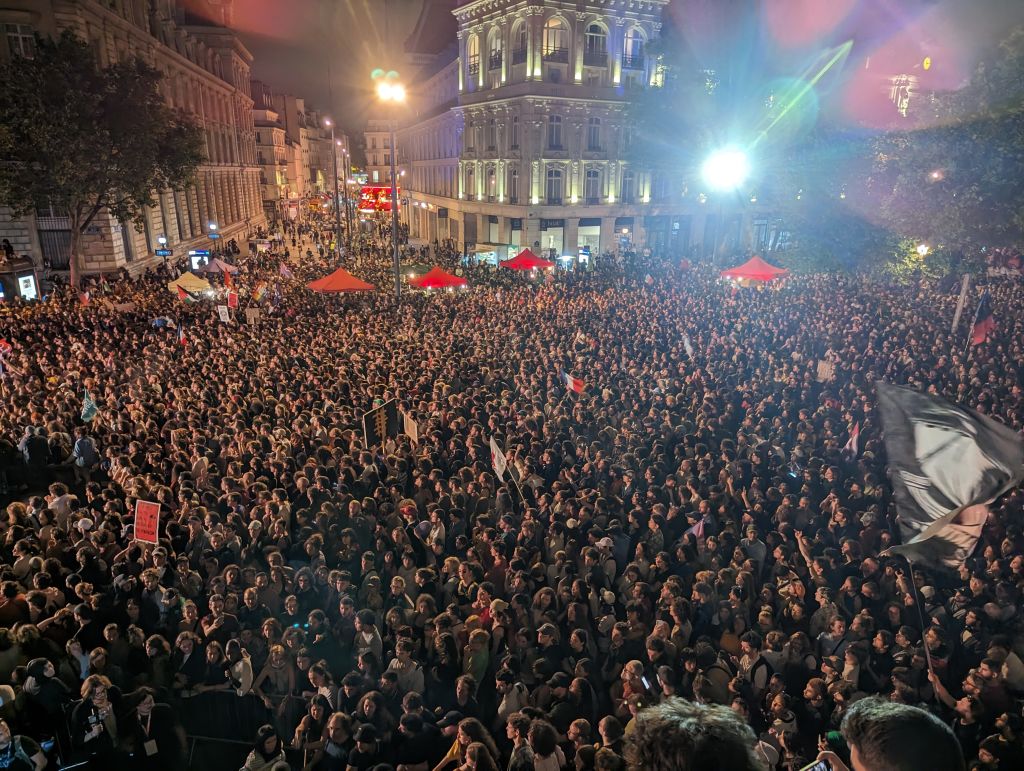
PARIS, FRANCE – JUNE 30: Demonstrators gather in Place de la Republique, to protest against the rising right-wing movement after the Rassemblement National’s victory in the first round of early general elections in Paris, France on June 30, 2024. (Photo by Luc Auffret/Anadolu via Getty Images)
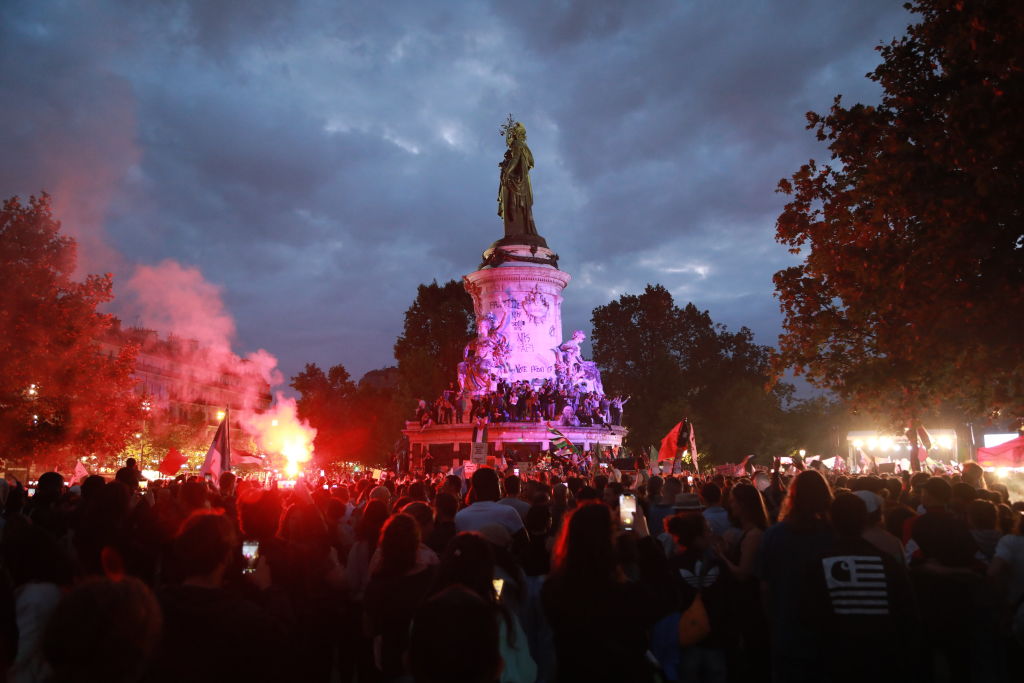
PARIS, FRANCE – JUNE 30: Demonstrators gather in Place de la Republique, to protest against the rising right-wing movement after the Rassemblement National’s victory in the first round of early general elections in Paris, France on June 30, 2024. (Photo by Mohamad Salaheldin Abdelg Alsayed/Anadolu via Getty Images)
What happens now in this week-long election?
When the Fifth Republic was established to replace the post-war Fourth in 1958 by General Charles De Gaulle, it was intended to address the faults of its predecessor, including by making the President much more powerful at the expense of Parliament, and introducing a voting system that strongly favours centrist or uncontroversial parties. This is achieved by a two-round vote, a knock-out round at first and then a decider where only the highest-performing compete for the seat.
In a fraction of seats, a really popular candidate can get enough votes in round one to knock out all of the competition and not have to go to round two. RN managed this with 38 candidates of a 577-seat house, including their leader Marine Le Pen, meaning she won’t personally have another election to fight this week. She is free to support her colleagues around the country with appearances for the next six days, likely meaning a lot of helicopter air miles.
The reality of this system means everyone has a chance to vote with their heart in the first round for the party they truly support and with their head on the second, for the lesser of two evils. For Marine Le Pen’s RN, which is clearly the most popular party in France at this time but which has no political friends, this means in every single seat where they’re hoping to confirm a first-place finish into a win this coming Sunday, they are up against the voters of all other parties cooperating to keep them out.
All that means there’s going to be an intense amount of negotiations and horse-trading between the diverse French parties in the early part of this week as they decide who to tell their own voters to back on Sunday if not themselves, and even in which seats to tactically withdraw from to give a clear run to an ally to keep out RN. Expect a lot of remarkable developments until the ballot papers for the next round go to the printers.
What about a right-wing coalition?
While is is technically possible for RN to really perform and win an outright majority in the Parliament next week — essential if they want to install their lead candidate Jordan Bardella as Prime Minister to take on or even take down President Macron — that would be absolutely them being on peak performance and clearing up. What is more likely — according to the polling, at this stage — is RN missing out on that majority by just a handful of seats. So is a right-wing coalition, like the left created before the vote, possible?
A deal between The RN and the legacy conservative Republican party (LR) seems the most obvious answer, but the LR leader suggesting just that earlier in this snap election led to the party nearly imploding. This acrimonious battle was between the pragmatic wing looking at getting Macron out, and the purity wing wishing to preserve their legacy by not allying with Le Pen, who is absolutely not a favourite of the French dinner-party class.
As it is, LR performed about as badly as expected on Sunday and if egos are put aside, could potentially contract local deals in particularly hard-fought areas. But don’t hold your breath, the decades-long Euro-elite attitude of “cordon sanitaire” around right-wing-populists dies hard.
There aren’t any other parties RN could realistically turn to. Eric Zemmour’s Reconquest party generates a lot of headlines but fared pretty terribly, not even managing one per cent.
What happens to Macron now?
Whoops! Looks like his gamble didn’t pay off. There’s a lot of chat on social media that this is actually a 4D-chess long game by Macron: give the right a taste of power, let the votersc watch them mess it up in real time, then swoop in with fresh elections later when public sentiment has turned against them. This theory relies on Le Pen’s RN actually being as incompetent/evil as the left imagines them to be, of course. It was first floated when Macron called the election in early June after he was handily defeated by RN at the European Parliament elections and people looked for plausible answers, and emerged again last night.
France has a two-term limit on Presidencies and Macron’s expires in 2027. Given he’s called term limits “damnable bullshit” in the past and his enthusiasm for reforming the French state, we can probably imagine if he was actually in control of French politics now he’d be trying to get that law struck off. After all, it was only introduced in 2008, so it isn’t like it’s a cast-iron part of the nation’s founding constitution.
Putting aside the Macron as a 4d chess master idea for now we’re left with the impression what really matters to him now is legacy management, and not wanting to spend the remaining three years in the Elysee palace a ‘lame duck’. Calling fresh national elections immediately after getting aggressively beat in the Euros makes that abundantly clear. A French broadsheet cites insider talk that the Macron camp is already planning to call yet another round of elections as soon as legally permitted after these ones, next year. So another roll of the dice.
Meanwhile the French must grin and bear it.
France returns to the polls on Sunday 7th and the composition of the next French Parliament will be known by the early hours of Monday morning.
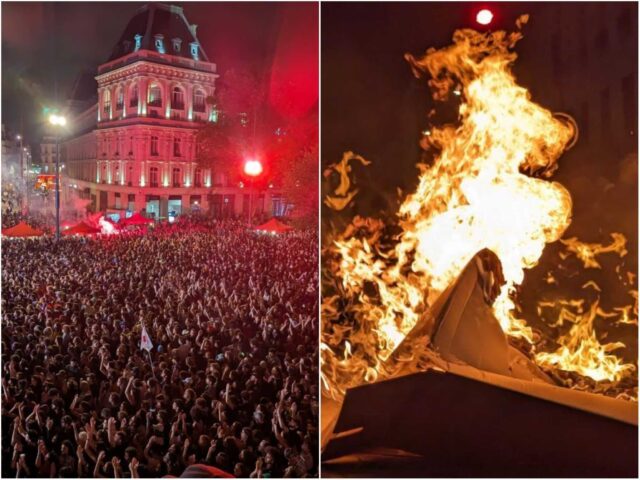
COMMENTS
Please let us know if you're having issues with commenting.